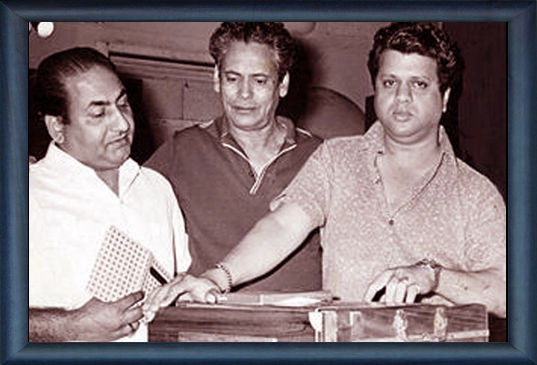Mohammad Rafi, one of the legends of the historical Hindi Film Industry still has his impact on the music lovers. His voice continues to haunt us even today. After all, he's left behind a rich legacy of songs sung by him over 35 years. Rafi's voice, ranging from the melancholic to the boisterous, was such that it suited every mood and every occasion in films. His is one voice that has been imitated the most: to be called a Rafi clone is actually regarded as a compliment by most newcomers. Yet, no one has been able to recreate the Rafi magic. Perhaps, no one can. At best, each of these singers has been able to imitate just one aspect of his voice. But nobody possesses the versatility that Rafi did.
Rafi was born in a small village called Kotla Sultan Singh near Amritsar on December, 24 1924. His family shifted to Lahore when he was still a baby. A fakir used to come to their locality in Lahore every day and sing. The young Rafi was so fascinated by him that he used to follow him around. His elder brother Hamid was aware of Rafi's love for music and encouraged it. In Lahore, Rafi started taking music lessons from Ustad Wahid Khan. One day Rafi and Hamid had gone to attend a performance by K L Saigal. But the legendary singer refused to sing since there was a power failure at the venue. Hamid went up to the organiser and asked if his brother could sing to keep the audience quiet. That was Rafi's first public performance at the age of 13.
As it turned out, the setting was just right for him. Among the audience sat noted composer
Shyam Sunder who was so impressed that he invited the young Rafi to come to Bombay. He recorded his first song in 1944 for a Punjabi film Gul Baloch with music director
Shyam Sunder. Not many people know that had acted in couple of films, Laila Majnu (1945) and Jugnu (1947). Rafi made his mark with 'Tera Khilona Toota Balak..' in Anmol Ghadi (1946). In the year 1944 Mohammad Rafi decided to move to Bombay where he was first given a break by
Naushad in Pehle Aap (1944). Rafi's first big hit was in Jugnu (1947) where he sang the duet 'Yahaan Badla Wafaa Ka Bewafaee Ke Siva..'' with Noor Jahan under Feroz Nizami.
His career took off with the all-time hit 'Suhani Raat Dhal Chuki..' from Dulari(1949).
There was no looking back aftermath and Rafi ruled as the undisputed king of playback singing till the early 70s. In spite of his success, Rafi remained an extremely quiet and reserved person. Many of his admirers could not fathom how such a low-profile man sounded so flamboyant in some of his songs. His son Shahid recalls, "When we asked him whether he had actually sung the 'yahoo' number, he just smiled and nodded. We kept asking him, 'how did you sing this song?' But he wouldn't expand on the subject. It was difficult for us to imagine a gentle person like him shouting out that yahoo." Perhaps, it was Rafi's humility and willingness to learn that made him such a great singer. He respected all his music directors, whether they were young or experienced. His contention was: you are teaching me a new song, so you are my ustad. If someone could not pay him his fees, he'd still sing for him and treat him the same way.
Although Rafi worked with different music directors, the one who recognised and exploited his immense talent was
Naushad. His first song for
Naushad was 'Hindustan Ke Hum Hain Hindustan Hai Hamara..' in the film Pehle Aap. The duo worked together to give hits such as Baiju Bawra and Mere Mehboob, to name a few. Rafi’s other fruitful partnership was with
S D Burman are Kagaz Ke Phool, Guide, Tere Ghar Ke Samne and Pyaasa.
Rafi was displaced by
Kishore Kumar in the early seventies but Rafi made a grand comeback with the Nasir Hussain musical Hum Kisi Se Kum Nahin (1977) and Amar Akbar Anthony the same year even winning the
National Award for 'Kya Hua Tera Vaada..' for the former. His last song was 'Tu Kahin Aas Paas..' in the film Aas Paas. He passed away on July 31, 1980. His immortality is vouched for by the fact that even almost two decades after his death, his popularity remains intact.

